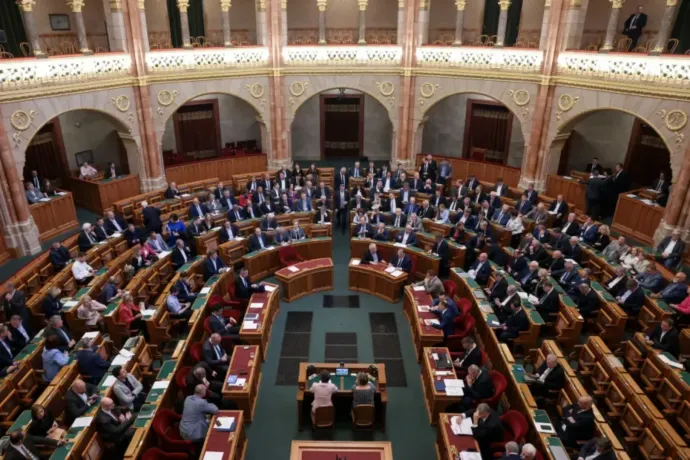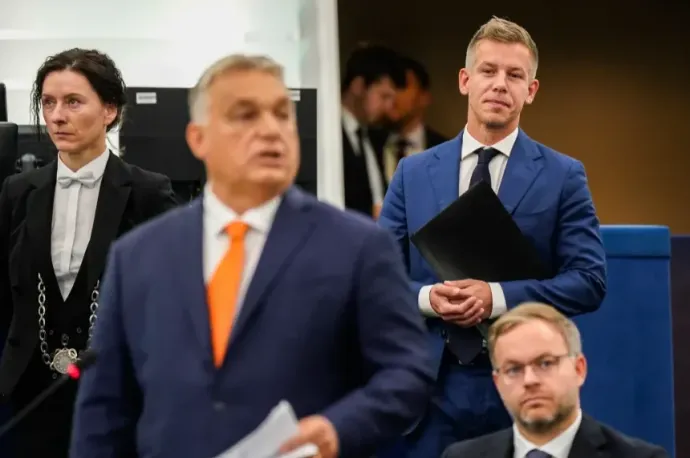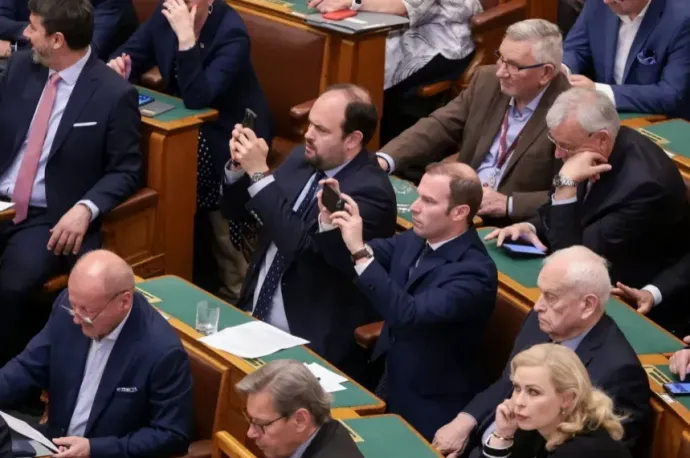Parliament passes controversial new laws

"I see our opponents are threatening again. We don't threaten, but we don't like being threatened either. We don't recommend it to anyone, in case we end up taking it seriously", Viktor Orbán said in his annual State of the Nation speech in February, a few days after Péter Magyar, the leader of the main opposition party had promised 20-year wealth investigations and announced the "Road to Prison" programme for politicians and oligarchs.
The Prime Minister then announced that the ruling party Fidesz was preparing to introduce an amendment to the law that would require Hungarian MEPs to make a declaration of assets similar to the one required of Hungarian MPs. Less than a month later, the proposal was tabled, and on Tuesday morning, it was adopted by a majority of the governing party in Parliament, with 136 votes in favour and 40 against.
In the future, Hungarian MEPs and their family members will have to make a declaration of assets at the beginning and end of their term of office, and by 31 January of each year in between, in exactly the same format as members of the Hungarian Parliament. Another similarity is that the declarations of family members will not be made public, but those of MEPs will be. However, there is one important difference compared to the Hungarian rules.
If an MEP writes false information in their declaration of assets or fails to fulfil their obligations and does not correct the error or make up the deficiency when asked to do so, the National Election Commission can terminate their mandate.
In contrast, there are no sanctions for members of the Hungarian Parliament who fill in their declaration of assets incorrectly. For decades, Members of Parliament have been able to write practically whatever they want on the document, and there are no consequences – if it is even discovered at all – if someone omits, for example, a HUF 1.5 billion state subsidy from their declaration of assets.
MEPs are already required to make asset declarations at the beginning and end of their term, but under EU rules, these are not made public. Hungarian MPs – and now MEPs too – have to declare much more: for example, their property, their major movable assets, their savings and their debts.

It is not difficult to guess that the amendment is primarily aimed at Péter Magyar, as Fidesz's goal may be to give the public an insight into the wallets of the Tisza Party MEPs as well, in addition to the huge wealth accumulated by the Prime Minister's entourage. The ruling party wants to make sure that it is revealed:
how much property, savings, shares and other assets the leader of the strongest opposition party actually has.
Earlier, Péter Magyar promised that the Tisza Party would launch a wealth investigation against politicians and their close family members who have held public office for 20 years. "Let's see what your family and mine have achieved in 20 years," he told Orbán. The Tisza Party would also make public the tax statements of all politicians going back five years. "Instead of pathetic political manoeuvres, let's give people the opportunity to see who in your environment really committed insider trading on the stock exchange or simply stole half the country's wealth."
A stricter drug law: from now on, only those who tip off the dealer can go to diversion
Parliament also passed the new drug law by 144 votes to 20, with 12 abstentions, which will in the future only allow people to be diverted if they tell the authorities from whom and under what circumstances they bought the drugs. In other words, a drug user can avoid a penalty if he gives up his dealer. They expect the stricter rules to reduce the number of people taking drugs. Part of the change is that drug users can now take advantage of diversion up to twice a year, compared to every two years previously. It is also included in the adopted proposal that anyone who lies to the authorities in the hope of diversion "commits the crime of perjury".
A six-month diversion is possible if the possession or consumption of a small amount of drugs is involved. Diversion is a second chance: those who have committed a minor drug offence can be exempted from prosecution. An important change is that the use of new psychoactive substances, i.e. designer drugs, is now also a criminal offence, whereas previously it was only a minor offence.
The Hungarian legislation currently in force was already the strictest drug law in Europe. This has been further tightened by the proposal adopted on Tuesday. In cases of homicide, the use of drugs before the crime will be an aggravating factor. Another new element in the adopted bill is that the police will be able to block the sites through which drugs can be ordered into Hungary. It is also a tightening of the law that in the future, a person "who has committed a drug trafficking offence as a particular repeat offender" will not be eligible for parole. The new drugs law extends the so-called public security detention: police can now detain "a person in a state of danger to himself or herself or to others, or who is incapacitated" for up to 72 hours if "necessary".
Viktor Orbán announced a crackdown on drug traffickers in his annual State of the Nation speech on 22 February, but it soon became clear that the government's war on drugs is also seriously affecting users, with a succession of police raids in recent weeks. The task was given to László Horváth, who was appointed government commissioner for the eradication of drug trafficking in March. Horváth said at a March press conference that the government's war on drugs has been very successful so far. According to him, more than 100 drug dealers have been arrested, and the number of users and new users has also decreased. He also claimed that there were significantly fewer drugs in circulation, while the price of drugs had increased three to four times, but it was not made clear at the press conference what he was basing these claims on.
Under-18s banned from buying energy drinks
Selling or serving energy drinks to persons under 18 years of age will be prohibited according to another bill, passed by 174 votes to none, with no abstentions, under which the government will issue a decree specifying the composition of energy drinks that will be banned.

According to one of the proposers, Christian Democrat Lőrinc Nacsa, the law is needed because the consumption of energy drinks by young people in Hungary has reached alarming proportions. According to a survey, 78% of them consume energy drinks, and one in five children aged 10-14 regularly drink energy drinks for breakfast. The aim of the legislation is to protect young people from the harmful effects of excessive consumption of energy drinks.
The two MEPs who tabled the proposal said earlier that they had consulted several governmental organisations, medical and family protection NGOs on the draft. Not surprisingly, the Hungarian Energy Drinks Association (MESZ) did not support the amendment. "Although the bill is about protecting children, we believe it does so in a discriminatory, double-standard way," said Sándor Csibi, secretary general of the MESZ. He does not understand why we do not protect our children in the same way "from Coke, which is promoted as family-friendly and is consumed ten times more than energy drinks".
Last year, a comprehensive study of the effects of energy drinks on young people was published, which found that they cause poorer sleep and poorer school performance, among other things. The combination of caffeine and sugar is not the most fortunate. However, opinions are divided on how unhealthy artificial sweeteners in sugar-free energy drinks actually are. Several studies have shown that they are harmful in large quantities, but whether they cause problems when consumed occasionally is another question.
For more quick, accurate and impartial news from and about Hungary, subscribe to the Telex English newsletter!